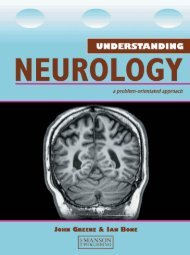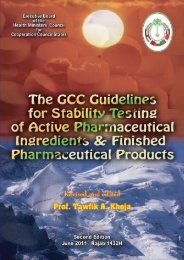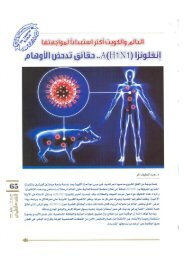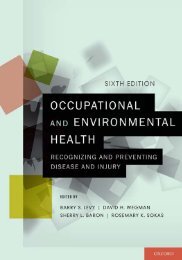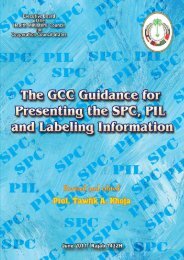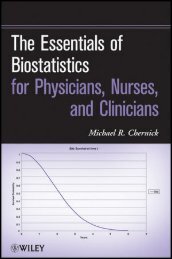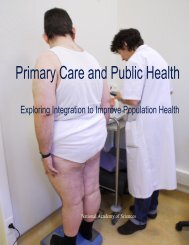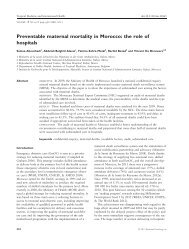Preventing Childhood Obesity - Evidence Policy and Practice.pdf
Preventing Childhood Obesity - Evidence Policy and Practice.pdf
Preventing Childhood Obesity - Evidence Policy and Practice.pdf
Create successful ePaper yourself
Turn your PDF publications into a flip-book with our unique Google optimized e-Paper software.
Chapter 19<br />
innovation in intervention development. All too<br />
often, the research proposals submitted <strong>and</strong> funded<br />
are strong in terms of trial methodology, but very<br />
weak in terms of the proposed intervention, drawn up<br />
by a group of “ experts ” with no public involvement,<br />
<strong>and</strong> a weak <strong>and</strong> unidisciplinary theoretical <strong>and</strong> empirical<br />
basis. There is an inevitable bias towards relatively<br />
simple, individually targeted interventions rather than<br />
more complex, multi - level interventions <strong>and</strong> programs.<br />
On the other h<strong>and</strong>, complex multi - level or<br />
settings - based interventions developed in conjunction<br />
with the target audience <strong>and</strong> based on strong theory,<br />
are typically evaluated using weak research designs<br />
with either no estimate of effect due to the absence of<br />
a summative evaluation, or potentially biased effect<br />
estimates at best.<br />
How to r eorient t owards h elpful, r igorous<br />
e valuation d esigns<br />
A helpful way to move away from this stereotype <strong>and</strong><br />
to prevent the perpetuation of an inadequate evidence<br />
base is to recognize the different stages of research<br />
needed in the development, evaluation <strong>and</strong> implementation<br />
of complex interventions. In health<br />
promotion, there are a number of models of stages<br />
of intervention research <strong>and</strong> evaluation, including<br />
15<br />
Nutbeam ’s six-stage development model. <strong>and</strong><br />
Green ’s Precede/Proceed framework, 16 which identify<br />
different research questions <strong>and</strong> the various<br />
research methods that are appropriate at each stage.<br />
The United Kingdom Medical Research Council<br />
(MRC) also published a framework for the evaluation<br />
of complex interventions 17 which identified five<br />
research stages, mirroring the stages of drug development<br />
research, of which the fourth stage was the<br />
definitive r<strong>and</strong>omized controlled trial. This model has<br />
been particularly helpful in highlighting the need for<br />
interventions to have been thoroughly developed<br />
through the prior stages, which may involve theoretical<br />
development, qualitative testing, modeling, feasibility<br />
testing <strong>and</strong> an exploratory trial, prior to<br />
large - scale summative evaluation, thus limiting the<br />
reproduction of the stereotype described in the previous<br />
paragraph. Box 19.2 gives an example of an intervention<br />
that has passed through a member of research<br />
stages prior to the final trial phase.<br />
Notwithst<strong>and</strong>ing necessary simplification, we provide<br />
recommendations for selected research designs<br />
Box 19.2 Case s tudy: fun ’ n<br />
h ealthy in Morel<strong>and</strong>!<br />
A series of obesity prevention studies conducted in<br />
Victoria, Australia demonstrate how the different<br />
research stages can be developed. A review of the<br />
child obesity literature was conducted in 2004 <strong>and</strong><br />
highlighted the increasing prevalence of child overweight<br />
<strong>and</strong> obesity <strong>and</strong> the complexity of environmental<br />
<strong>and</strong> socio - cultural determinants. A clear gap in the<br />
evidence base in relation to effective interventions led<br />
to the development of a pilot study conducted in three<br />
diverse primary schools — in inner urban, suburban<br />
<strong>and</strong> rural areas. This formative evaluation was conducted<br />
to test the feasibility <strong>and</strong> acceptability of a trial<br />
methodology, <strong>and</strong> a range of school, parent <strong>and</strong> child<br />
measures. As a result of this pilot study, the methodology<br />
<strong>and</strong> measures were adjusted to improve acceptability<br />
<strong>and</strong> comprehensibility <strong>and</strong> a study design was<br />
developed using a socio - environmental theoretical<br />
framework actioned by the Health Promoting in<br />
Schools Framework <strong>and</strong> culturally competent community<br />
development strategies. A five - year cluster<br />
r<strong>and</strong>omized controlled trial, fun ’ n healthy in Morel<strong>and</strong>!,<br />
was consequently implemented in 2004. This child<br />
health promotion <strong>and</strong> obesity prevention intervention<br />
<strong>and</strong> research study involves 24 primary schools in an<br />
inner - urban, culturally diverse area of Melbourne,<br />
Australia. It is being conducted in partnership with the<br />
local community health service. A comprehensive<br />
mixed method summative evaluation will allow an<br />
assessment of what worked, for whom, how, why <strong>and</strong><br />
at what cost. 27<br />
for each of the two main stages of evaluation research,<br />
formative <strong>and</strong> summative. These stages can be mapped<br />
onto the three frameworks referenced above, <strong>and</strong><br />
provide a useful classification to aid the presentation<br />
of key issues in evaluation research design. However,<br />
it is not intended to suggest that the identification of<br />
specific research questions can only be done with reference<br />
to this sequence. Indeed, as we describe below, it<br />
is likely that key questions regarding the acceptability,<br />
implementation <strong>and</strong> causal mechanisms of an intervention<br />
will need to be addressed at each of these stages.<br />
Formative e valuation<br />
By identifying five research stages that are comparable<br />
to the stages of drug development research, the MRC<br />
160



